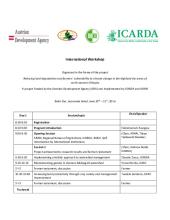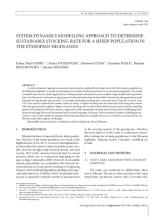/ library resources
Showing items 1 through 9 of 37.Reducing land degradation and farmers’ vulnerability to climate change in the highland dry areas of north-western Ethiopia inception workshop agenda.
This paper argues and provides empirical evidence that trade-offs and/or complementarities are
inherent in technological options that shape the adoption of and land-use decisions in production
systems involving multiple crops in Ethiopia. By applying a fractional response model to a
Experience from Learning Watersheds: Achievements and Implications of the work done by the WLRC.
Introduction to the closing workshop on "Reducing land degradation and farmers’ vulnerability to climate change in the highland dry areas of north-western Ethiopia ". -> a succes story including scope for further reserach
The document presents research activities on Mitigating Soil Erosion and Water Scarcity, Increasing Farmers’ Adaptation Capacity to Climate Change in the Highland dry areas of Ethiopia
A system dynamics approach was used to determine the sustainable stocking rate of the Menz sheep population in the Ethiopian highland. A model was developed to simulate stocking rate based on communal grazing land. The model is weather and resource (feed supply) driven.
Widespread heat waves, floods, and droughts last year were a strong reminder of the threats posed by climate change. In the non-tropical dry areas where ICARDA works we are becoming accustomed to record high temperatures and increasing water scarcity year on year.
This issue of Caravan describes the new program, and some of the research innovations it will build on. The issue begins with two ‘opinion pieces’ by scientists from partner organizations in the CRP.
Project goal is to reduce food insecurity and improve livelihoods of poor people living in African
drylands by restoring degraded land
and returning it to effective and sustainable
tree, crop and livestock production, thereby
increasing land profitability as well as landscape
Paginación
Land Library Search
Through our robust search engine, you can search for any item of the over 73,000 highly curated resources in the Land Library.
If you would like to find an overview of what is possible, feel free to peruse the Search Guide.









